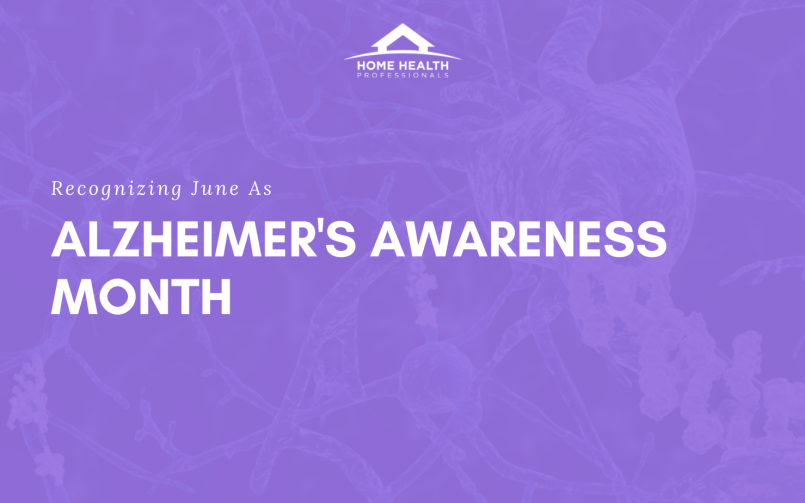
Alzheimer’s & Brain Awareness Month
Did you know that over 55 million people are dealing with Alzheimer’s or some other type of dementia disorder, worldwide? Scientists believe Alzheimer’s disease prevents brain cells from functioning correctly. As damage to those malfunctioning cells spread, the cells themselves eventually die, causing irreversible damage to the brain. Currently, Alzheimer’s Disease accounts for 60% – 80% of dementia patients. There is not yet a cure for Alzheimer’s disease, however, there are signs and symptoms that may help with early detection of the disease.
Early Detection
Early detection of Alzheimer’s allows each patient the ability to access a potential treatment and the ability to get personal affairs in order. Currently, there is only one treatment that has been approved by the FDA to help cope with early-onset Alzheimer’s, Aducanumab. This drug is not a cure for the disease but can help reduce clinical decline in patients. This means more time for individuals to actively participate in their life. Apart from this treatment, Alzheimer’s patients are encouraged to take control of their life by eating well, exercising, and putting legal, financial, and end-of-life plans in place while they still have the ability to participate in decision-making. The following signs may help with early detection of Alzheimer’s disease:
- Memory loss, which disrupts daily life
- Challenges when planning or solving problems
- Difficulty completing familiar tasks
- Confusion with times or places
- Trouble understanding visual images and distances
- Sudden problems with speaking or writing
- Misplacing items or the inability to retrace steps
- Decreased or poor judgment
- Withdrawal from work or social activities
- Changes in mood and personality
The life expectancy of an Alzheimer’s patient is usually 4-8 years after diagnosis, but some individuals have the potential to live 20 years or more depending on health factors. Alzheimer’s prevention is still uncertain since many risk factors such as genetics, age, and family history, are out of a patient’s control. However, other preventable risk factors, like heart health and head injuries, if avoided, can help reduce the chances of acquiring Alzheimer’s. Below is a list of healthy changes that you can make today to reduce your risk of Alzheimer’s in the future:
- Regular exercise and incorporating healthy eating habits through DASH and Mediterranean-type diets.
- DASH stands for Dietary Approaches to Stop Hypertension. This diet highlights fruit, veggies, fat-free or low-fat dairy products, whole grains, fish, poultry, beans, seeds, nuts, and vegetable oils. It limits sodium, sweets, sugary beverages, and red meats.
- The Mediterranean diet incorporates very little red meat and emphasizes whole grains, fruits, vegetables, fish and shellfish, and healthy fats such as nuts and olive oil.
- Maintain strong social connections!
- Keeping social and connecting with people can lower the risk of cognitive decline and Alzheimer’s. This may be due to mental stimulation that can strengthen nerve cells in the brain.
- Prevent head trauma
- Always wear a seat belt
- Use a helmet when necessary
- Fall-proof your home; Minimize clutter, clear floor space of wires and loose rugs, and ensure optimal lighting. These simple steps can prevent a fall that could change your life.
- Decrease your risk for heart disease
- High Blood Pressure, Diabetes, and High Cholesterol increase the risk of developing Alzheimer’s. According to the Alzheimer’s Associate, nearly 80% of individuals with Alzheimer’s disease also have cardiovascular disease.
Because the brain can use up to 50% of the body’s blood supply, it’s important to have a healthy heart (blood supply) to fuel your brain. Studies show that Latinos are 1.5 times more likely to be diagnosed with Alzheimer’s; African Americans are 2 times more likely. The reasoning behind this is not well understood, but some scientists speculate that higher rates of vascular disease are a contributor to Alzheimer’s. Scientists, associations, and support groups are constantly conducting preventative studies to discover more about Alzheimer’s and what we can do to fight this disease.
With all the changes that occur with Alzheimer’s let us come in and help you and your loved one make sense of all the little details you may have missed. Our Alzheimer’s and Dementia program includes both our nursing and therapy services. Let our skilled nurses complete physical assessments, medication reviews and perform home health environment evaluations. Our Physical Therapists work to improve functional strength and mobility to help regain independence in the home. Home Health Professionals strives to educate you and your loved one on how to cope with this disease. Our offices are located in Houston and Dallas, contact us today to help you through this transition. Simply ask your physician to refer you to Home Health Professionals, and let our professionals bring their expertise to you!
Houston Office Dallas Office
713.942.0100 214.368.1100
You must be logged in to post a comment.